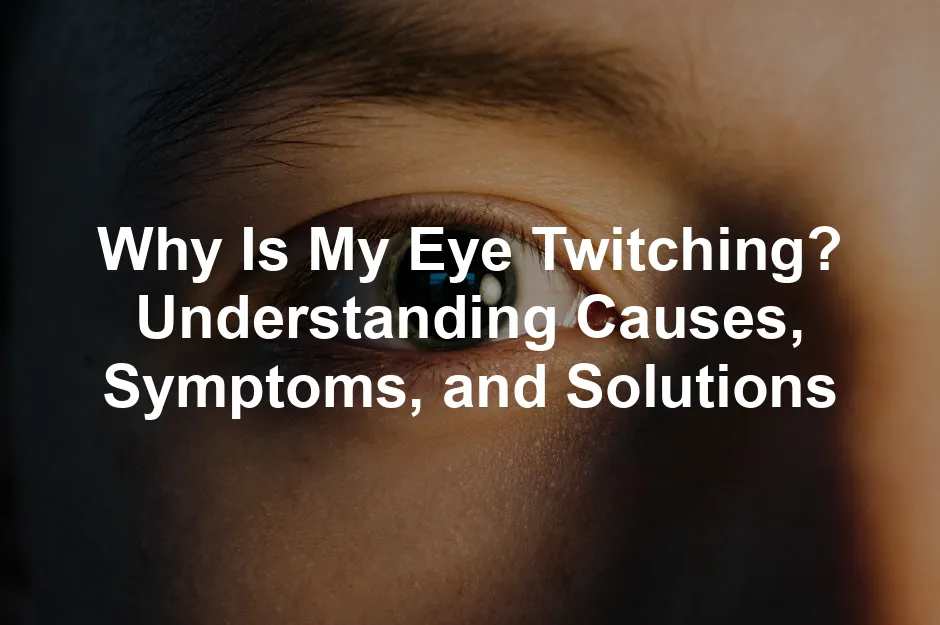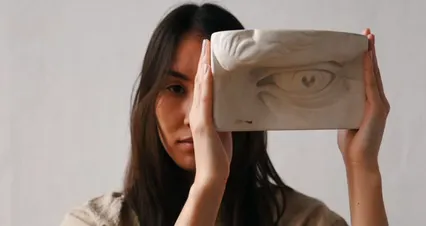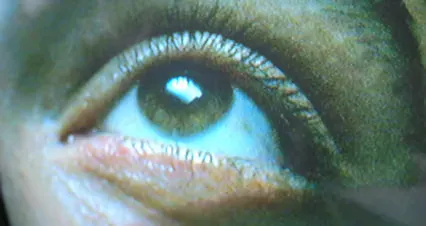
Why Is My Eye Twitching? Understanding Causes, Symptoms, and Solutions
Introduction
Eye twitching can feel like an annoying but harmless nuisance, often sparking curiosity and concern. Have you ever been in a meeting, trying to concentrate, when suddenly, your eyelid starts to dance like it has a mind of its own? Fear not! You’re not alone in this battle against the twitch. In fact, eye twitching is a common occurrence that affects many people, and while it may seem trivial, it can lead to significant discomfort and frustration.
So, what exactly is going on? Eye twitching, or eyelid spasms, often manifests as brief, involuntary contractions of the eyelid muscles. These twitches can occur in one or both eyes and may last for a few seconds or even longer—a true test of your patience! The reasons behind this twitching can vary widely, ranging from everyday stress and fatigue to more serious conditions that may require medical attention.
This article will guide you through the surprising reasons behind eye twitching. We’ll cover everything from the mundane—like too much caffeine—to the more complex, such as neurological disorders. By the end, you’ll be armed with knowledge about what’s causing that pesky twitch and how to manage it effectively.
Whether you’re a caffeine lover who just can’t quit or someone feeling the weight of a busy lifestyle, understanding the triggers and solutions for eye twitching is vital. So, let’s jump right in and demystify this common phenomenon. You’ll find tips and tricks to help ease those twitches, making your days a little brighter and your eyelids a bit calmer. Ready? Let’s get twitching!

Understanding Eye Twitching
What is Eye Twitching?
Eye twitching, also known as eyelid spasms or tics, is that pesky little dance your eyelid does when it feels like being a superstar. It’s an involuntary contraction of the eyelid muscles, often occurring without warning. You might notice it as a brief flutter or a more persistent spasm. This twitch can manifest in one or both eyes and can last anywhere from a few seconds to several minutes—turning a perfectly normal moment into an awkward episode!
While the condition may seem alarming, most cases of eye twitching are benign and temporary. The involuntary nature of these spasms means you have zero control over them, much like trying to stop a toddler from throwing a tantrum. The duration can vary; in many instances, it might resolve on its own after a few minutes, yet some people experience a more prolonged twitch that lingers for days or even weeks.
Types of Eye Twitching
Eye twitching comes in various flavors, each with its unique quirks and causes.
- Minor Eyelid Twitch: This is your everyday twitch, often linked to fatigue, stress, or caffeine overload. It’s like your eyelid’s way of saying, “Hey, give me a break!” Usually, it’s harmless and goes away on its own.
- Eyelid Myokymia: A bit fancier than a minor twitch, eyelid myokymia refers to persistent yet mild spasms, primarily affecting the lower eyelid. Triggers can include stress, lack of sleep, and excessive caffeine. You might feel a gentle tugging sensation, but it’s rarely a cause for concern.
- Benign Essential Blepharospasm: Now we’re entering the big leagues! This condition involves more intense and chronic twitching around the eyelids. It can lead to partial or complete eyelid closure, which can significantly impact your daily life. If you notice this happening frequently, it’s worth chatting with a healthcare professional.
- Hemifacial Spasm: A rare bird in the eye twitching family, hemifacial spasm affects one side of the face. It often starts with twitches around the eyelid but can progress to involve other facial muscles. Typically, this is caused by a blood vessel pressing against a facial nerve, and while it’s uncommon, it does require medical attention.

Common Causes of Eye Twitching
Everyday Triggers
Ah, the daily grind! Sometimes, it feels like life is throwing everything at you, and your eyelids are the first to protest. Here are some common culprits behind your eye-twitching woes:
- Stress and Anxiety: Ever notice how your eyelid starts dancing when your workload piles up? Emotional factors like stress and anxiety can lead to muscle spasms, turning your eyelid into a mini maraca. Finding ways to unwind can help calm those jittery muscles. Try using a Stress Relief Adult Coloring Book to channel your inner artist and release some of that pent-up tension.
- Fatigue and Sleep Deprivation: Sleep deprivation makes us all a bit cranky, but it can also lead to unwanted eyelid spasms. When you’re running on empty, your body tends to rebel, and your eyelids are no exception. So, don’t skimp on that beauty sleep! A Sleep Mask for Better Sleep can help you catch those zzz’s in peace!
- Caffeine and Stimulants: Your morning cup of joe might be doing more harm than good. Excessive caffeine intake can overstimulate your nervous system, leading to those pesky twitches. Maybe it’s time to swap one of those cups for a soothing herbal tea? Check out this Herbal Tea Variety Pack to help you unwind.
- Eye Strain: In today’s digital world, our eyes face constant strain from screens. Prolonged screen time, coupled with poor lighting, can lead to eye fatigue and twitching. Give your eyes a break every now and then—your eyelids will thank you! Consider using Blue Light Blocking Glasses to reduce strain while you work or binge-watch!

Less Common Causes
While most eye twitching can be traced back to common triggers like stress or caffeine, there are less common culprits lurking in the shadows. Let’s shine a light on these sneaky causes that might have your eyelids shimmying.
- Nutritional Deficiencies: Did you know that your diet could be causing those pesky spasms? Nutritional deficiencies, particularly in magnesium, can lead to involuntary muscle contractions. Magnesium is the unsung hero for muscle health, and without enough of it, your eyelids might just take matters into their own hands—literally! Other potential deficiencies include calcium and B vitamins, which can also play a role in muscle function. So, if you’re feeling twitchy, it might be time to check your plate! Consider a Magnesium Supplement to support your muscle health.
- Medication Side Effects: Sometimes, the very medications meant to help us can have a side effect that leaves us twitching. Certain drugs, especially those used for psychosis, epilepsy, or mood stabilizers, can trigger eye spasms. If you notice your eyelids dancing after starting a new medication, don’t hesitate to consult your healthcare provider. They may suggest adjustments or alternatives that keep your eyelids calm.
- Underlying Health Conditions: It’s not all fun and games when it comes to eye twitching. Certain neurological disorders can also be linked to this condition. For instance, conditions like Bell’s palsy, dystonia, or even Tourette syndrome might be in the mix. If your twitching is persistent and accompanied by other symptoms—like weakness or facial spasms—it’s crucial to seek medical advice. After all, our bodies are complex machines, and sometimes they need a little extra care!

When to Seek Medical Help
Signs it’s Time to See a Doctor
Eye twitching can be a pesky little annoyance, but when should it raise a red flag? While most cases are harmless, certain symptoms signal that it’s time to grab your phone and book an appointment. Here’s what to look out for:
If you notice persistent twitching that lasts more than a few days, it’s worth investigating. Your eyelid shouldn’t feel like it’s auditioning for a role in a dance show, after all! Another red flag is if the twitching interferes with your vision. If your eyelid closes completely or you struggle to keep your eyes open, don’t wait. That’s your body’s way of saying, “Hey, I need some help here!”
Additionally, if the twitching spreads to other facial muscles, it could indicate a more serious underlying condition. So, if your eyelid starts to recruit backup dancers, it’s time to consult a healthcare professional.
During your consultation, expect a thorough evaluation. The doctor will likely ask about your medical history, lifestyle, and any medications you’re taking. They might perform some tests to rule out other conditions. This could include vision tests, neurological assessments, or blood tests to check for deficiencies.
Don’t be surprised if they ask about your stress levels or sleep habits, too! After all, the eye twitching party often has a guest list that includes fatigue, caffeine, and stress.
If your eye twitching is accompanied by other symptoms, such as pain, swelling, or changes in eye appearance, it’s crucial to seek medical attention immediately. These could indicate conditions like blepharitis or even neurological disorders. Your eyes are precious; treat them like royalty!
In summary, while eye twitching can often be a fleeting annoyance, it’s essential to listen to your body. If your eyelid starts acting up for an extended period or begins to interfere with your daily life, don’t hesitate to seek help. The sooner you address the issue, the better—because nobody wants a twitchy eye to steal their spotlight!

Conclusion
Eye twitching, while often benign, can sometimes serve as an important signal from your body. Understanding the various causes and treatments can help you manage this common condition effectively.
Most of the time, a simple lifestyle adjustment can work wonders. Reducing caffeine intake, getting enough sleep, and managing stress can ease those pesky twitches. Remember, your eyelids deserve a break too! Consider incorporating some calming scents into your routine with an Essential Oil Diffuser and essential oils.
However, if the twitching becomes persistent or affects your vision, it’s wise to consult a healthcare professional. They can help identify any underlying issues and provide appropriate treatments. This might include medication or even Botox for more severe cases.
By recognizing the signs and knowing when to seek help, you can tackle eye twitching head-on! Whether it’s a friendly chat with a doctor or a few lifestyle tweaks, you now have the tools to keep those eyelids calm and collected.
So, the next time your eye starts to twitch, don’t panic. Instead, take a deep breath, assess the situation, and remember: you’re not alone in this! With the right approach, you can keep those eyelids in check and regain your peace of mind. Here’s to calm, twitch-free days ahead!

FAQs
Please let us know what you think about our content by leaving a comment down below!
Thank you for reading till here 🙂
If you’re curious about the reasons behind your eyelid’s sudden movements, you can explore more about why your eye might be twitching.
All images from Pexels




